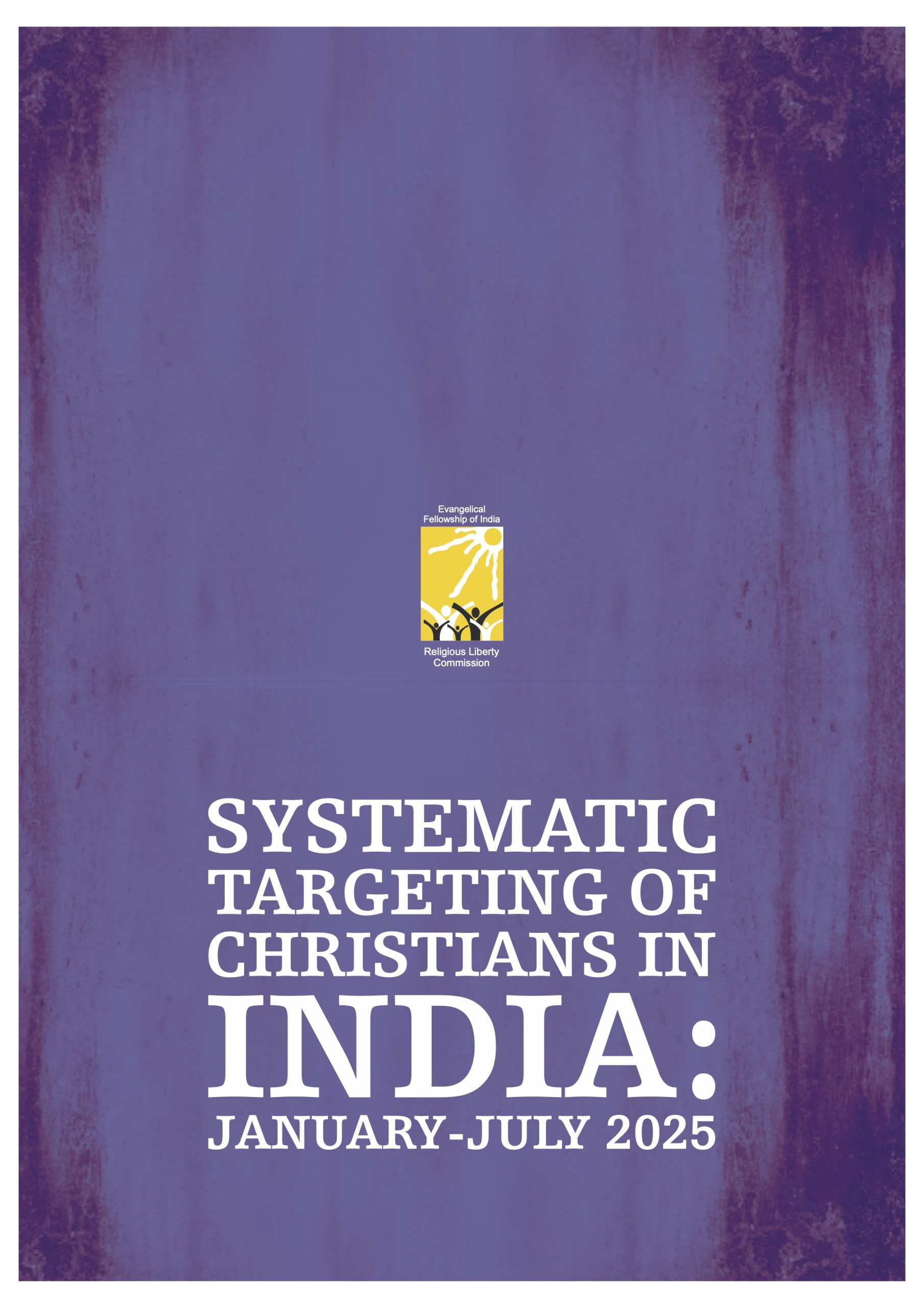EFIRLC Report – Systematic Targeting of Christians in India: January to July 2025

EFIRLC, Jan - July 2025, Persecution of Christians in India, RLC Report
Executive Summary Report
August 4, 2025
Critical Findings
The Religious Liberty Commission of the Evangelical Fellowship of India has documented 334 incidents of systematic targeting against Christian communities across India between January and July 2025. These verified cases represent a sustained pattern of violations affecting Christians in 22 states and union territories, with incidents occurring consistently every month.
Uttar Pradesh recorded 95 incidents while Chhattisgarh documented 86 incidents, together accounting for 54% of all violations. These states have emerged as areas where Christian families face immediate violence and prolonged legal challenges under anti-conversion laws. The systematic nature across multiple states indicates widespread challenges to religious freedom requiring urgent attention.
Documented Pattern of Violations
The incidents reveal a coordinated pattern of targeting that employs both legal mechanisms and social pressure to suppress Christian religious expression. Threats and harassment account for 107 incidents, while false accusations and arrests represent 116 cases, together comprising two-thirds of all documented violations. This data demonstrates that intimidation and misuse of legal processes are primary methods being employed against Christian communities.
Physical violence affected 42 incidents, while worship services were disrupted in 29 cases, often occurring strategically during Sunday gatherings to maximize psychological impact on entire congregations. Most disturbing are the 13 cases involving denial of burial rights, with 92% occurring in Chhattisgarh alone, where Christian families are prevented from honouring their deceased according to their faith even on private property.
The timing patterns reveal deliberate targeting, with many incidents strategically occurring during Sunday worship services, indicating systematic monitoring and disruption of Christian religious gatherings. This represents a fundamental breach of constitutional guarantees protecting religious freedom and assembly.
Escalating Violations and Institutional Concerns
Multiple serious incidents in July 2025 demonstrate escalating violations. Six pastors in Bhilai, Chhattisgarh, were severely beaten with wooden batons inside Durg jail after identifying themselves as pastors. They had been taken to the police station along with other Christians, after members reportedly belonging to the Bajrang Dal had laid siege on their Church building and had disrupted the worship service on 20 July 2025. Despite documented complaint and photo evidence of custodial violence, charges against the pastors remain active while no action has been taken against those responsible or those who laid seize to the Church.
On July 25, 2025, two Catholic nuns from Kerala, Sister Preeti Mary and Sister Vandana Francis, were arrested at Durg Railway Station while accompanying three young tribal women to employment opportunities in Agra. Despite written parental consent and proper documentation, they were charged under trafficking and anti-conversion laws following complaints by members of a Hindutva group.
Video footage shows the nuns being threatened by Jyoti Sharma of Durga Vahini Matrushakti inside the police station while officers stood by. One woman later reported being coerced into false testimony, alleging threats against her family if she refused to comply. The case sparked national political outrage, illustrating how coordination between different actors can criminalize basic social service activities.
Misuse of Anti-Conversion Laws
Anti-conversion laws, ostensibly designed to prevent coercive conversions, are being systematically exploited to criminalize legitimate religious activities and social service work. The vague language enables arbitrary application, with Christians facing potential imprisonment of up to 10 years for constitutionally protected activities. The pattern reveals legal frameworks intended to protect religious freedom being used to restrict it.
Impact on Religious Freedom and Community Life
These violations create serious consequences extending beyond immediate victims to entire communities and the constitutional promise of religious freedom. Christian families face physical violence, legal challenges, and social isolation through denial of burial rights and community exclusion, often forcing displacement from ancestral villages. The systematic suppression has created a climate of fear forcing self-censorship among Christian communities, undermining the constitutional guarantee of religious freedom.
Need for Immediate Intervention
The documented evidence indicates urgent need for intervention to restore constitutional protections. Law enforcement agencies must fulfill their constitutional duty to protect all citizens regardless of faith. The systematic misuse of anti-conversion laws requires immediate review to ensure alignment with constitutional principles. Authorities must ensure extremist groups cannot disrupt religious gatherings and intimidate communities with impunity.
The denial of burial rights represents such a fundamental violation of human dignity that it requires immediate intervention. These 334 documented cases likely represent only a fraction of actual violations, as many go unreported due to fear of reprisals. The systematic nature indicates organized efforts to suppress religious freedom that require urgent attention to restore constitutional protections for all religious minorities.
Call for Protection of Religious Freedom
The constitutional promise of religious freedom for all citizens requires immediate, concrete action from government authorities, law enforcement agencies, and the judicial system. The Religious Liberty Commission, representing India’s evangelical community through the Evangelical Fellowship of India’s network of over 65,000 churches nationwide, remains committed to working with all stakeholders to address these systematic violations.
The full report can be accessed by clicking THIS link.
For further information please contact mail@efirlc.org.